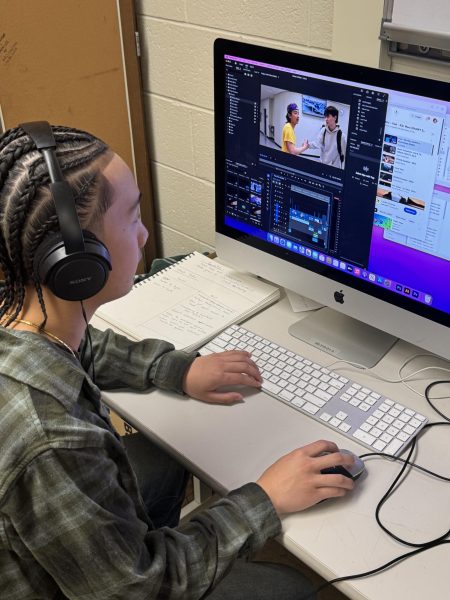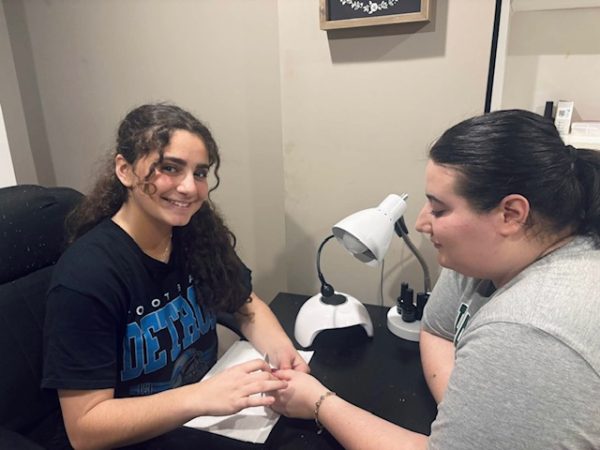Technology takes over
Gone are the days spent outside playing in the dirt without a care in the world. Technology and phones have replaced these
simple joys in life with their addictive nature.
Statistics on phones
Apple found the average person unlocks their phone 80 times a day and types, taps and swipes more than 2600 times a day, according to the research firm Dscout.
“I think it’s a significant problem at this point and it’s affecting all ages,” professional and national certified counselor Karin Palombella said.
Technology became a significant part of life in the last couple of years, so much so that many people couldn’t bear living without their phones for even a day. In today’s society, 31 percent of kids between the ages of 8-10 and 69 percent between the ages of 11-14 own phones, according to WebMD.
“If you didn’t have your phone, then you’d miss out on everything happening because everything is put out over social media,” sophomore Evan Gregorich said.
Clients have reported spending hours on their phone or tablet scrolling through social media when a healthier amount would be 15 minutes at a time, Palombella said.
What makes phones addicting?
Phones can be used to connect people, play games, go on social media or simply out of boredom. But what actually makes them so addicting?
When people are on their phones, it stimulates a reward center in the brain which releases a rush of dopamine, according to AP Psychology teacher Lisa Hallam. The brain loves dopamine, so it links phones with that surge of happiness produced.
Another reason for the addiction, aside from the science, is phones can serve as distractions.
“It gives people like a little bit of an escape. They can forget what bill is due and what’s not done around the house and what’s going on in their life,” Palombella said.
Phones versus relationships
Although phones make people believe they are happy, that isn’t necessarily true. Phones can affect relationships of all kinds, according to Palombella.
“I know a couple people who work in the food service industry and they go to wait on a table and there’s five family members and they’re all playing on their cell phones at a restaurant,” she said.
This divide between interaction with phones over people is due to the belief the brain can multi-task when it just can’t, no matter how much one wants to believe it can, according to Hallam.
The convenient aspect of a phone’s ability to shoot off a quick text instead of calling someone or talking to them in person causes a lack of social skills in society. In fact, the number of texts sent monthly increased from 12 million in 2010 to 781 billion in 2017, according to Statistic Brain. Phones make physical social interaction easily avoidable.
“I think with the constant use of text messaging, social skills have decreased a bit,” Palombella said.
Phones not only affect relationships with others, but also with oneself. Seeing social media posts of friends or celebrities can cause people to think their own life is never good enough Palombella said.
Up all Fortnite
Over the past few months a new game took over the lives of many students: Fortnite. More than 3.4 million people currently play, 45 million are registered and the numbers continue to grow according to Epic Games and pc.gamesh.com Fortnite became the most viewed game on YouTube, according to the marketing platform Matchmade.
The game gives players an adrenaline rush and makes them want to win, according to sophomore Dominic Dombrow.
“It just makes me feel good about myself, then I can sleep well that night,” Dombrow said.
The future of technology
Despite the negative aspects to consider, phones still play a huge role in peoples’ lives.
Like with all other issues, there are multiple sides to the spectrum. Phones can cause a lack of social skills and addiction, but they can also serve as an easy way to reach people. Who knows what else technology has in store?
“I would think it’s going to keep growing,” Palombella said. “Hopefully it will continue to make things easier for people and hopefully it’ll enable us to reach others in emergencies and things like that.”
Your donation will support the student journalists of Eisenhower High School. Your contribution will allow us to purchase equipment and cover our annual website hosting costs.






